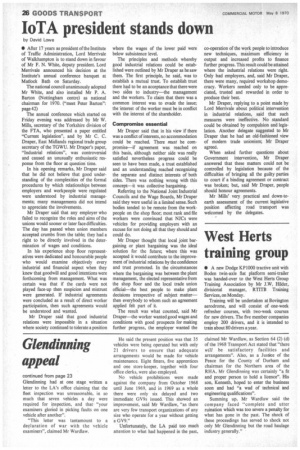IoTA president stands down
Page 28

If you've noticed an error in this article please click here to report it so we can fix it.
by David Lowe
• After 17 years as president of the Institute of Traffic Administration, Lord Merrivale of Walkhampton is to stand down in favour of Mr F. N. White, deputy president. Lord Merrivale announced his decision at the Institute's annual conference banquet at Matlock Bath on Saturday.
The national council unanimously adopted Mr White, and also installed Mr P. A, Barton (Nottingham centre) as national chairman for 1970. ("meet Peter Barton": page 42) The annual conference which started on Friday evening was addressed by Mr W. Mills, secretary of the Yorkshire division of the FTA, who presented a paper entitled "Current legislation", and by Mr C. C. Draper, East Midlands regional trade group secretary of the TGWU. Mr Draper's paper, "Industrial relations", was controversial and caused an unusually enthusiastic response from the floor at question time.
In his opening remarks, Mr Draper said that he did not believe that good understanding of the complexities of the formal procedures by which relationships between employers and workpeople were regulated were understood by industrial managements; many managements did not intend to appreciate the involvements.
Mr Draper said that any employer who failed to recognize the roles and aims of the unions would sooner or later face difficulties. The day has passed when union members accepted crumbs from the table; they had a right to be directly involved in the determination of wages and conditions.
In his experience shop floor representatives were dedicated and honourable people who would examine objectively every industrial and financial aspect when they knew that goodwill and good intentions were forthcoming from management. What was certain was that if the cards were not played face-up then suspicion and mistrust were generated. If industrial agreements were concluded as a result of direct worker participation, then such agreements would be understood and wanted.
Mr Draper said that good industrial relations were impossible in a situation where society continued to tolerate a position where the wages of the lower paid were below subsistence level.
The principles and methods whereby good industrial relations could be established were outlined by Mr Draper as he saw them. The first principle, he said, was to establish a mutual trust. To establish trust there had to be an acceptance that there were two sides to industry—the management and the workers. To claim that there was a common interest was to evade the issue; the .interest of the worker must be in conflict with the interest of the shareholder.
Compromise essential Mr Draper said that in his view if there was a conflict of interests, no accommodation could be reached. There must be compromise—if agreement was reached on this basis, although neither side was really satisfied nevertheless progress could be seen to have been made, a trust established and an understanding reached recognizing the separate and distinct interests of both sides. There was nothing wrong with this concept—it was collective bargaining.
Referring to the National Joint Industrial Councils and the Wage Boards, Mr Draper said they were useful in a limited sense. Such bodies tended to be remote from the workpeople on the shop floor; most rank and file workers were convinced that NJCs were vehicles for providing employers with an excuse for not doing all that they should and could do.
Mr Draper thought that local joint bargaining or plant bargaining was the ideal solution for the future; where this was accepted it would contribute to the improvement of industrial relations by the confidence and trust promoted. In the circumstances where the bargaining was between the plant management, the elected representative from the shop floor and the local trade union official—the best people to make plant decisions irrespective of subject matter— then everybody to whom such an agreement applied felt part of it.
The result was what counted, said Mr Draper—the worker wanted good wages and conditions with good prospects for making further progress, the employer wanted the co-operation of the work people to introduce new techniques, maximum efficiency in output and increased profits to finance further progress. This result could be attained where the industrial relations were right. Only bad employers, and, said Mr Draper, there were many, required workshop democracy. Workers needed only to be appreciated, trusted and rewarded in order to produce their best, Mr Draper, replying to a point made by Lord Merrivale about political intervention in industrial relations, said that such measures were ineffective. No standard could be obtained by compulsion and legislation, Another delegate suggested to Mr Draper that he had an old-fashioned view of modern trade unionism; Mr Draper agreed.
When asked further questions about Government intervention, Mr Draper answered that these matters could not be controlled by legislation because of the difficulties of bringing all the guilty parties to court if a binding agreement or contract was broken; but, said Mr Draper, people should honour agreements.
Mr Mills' very practical and down-toearth assessment of the current legislative position affecting road transport was welcomed by the delegates.
















































































































